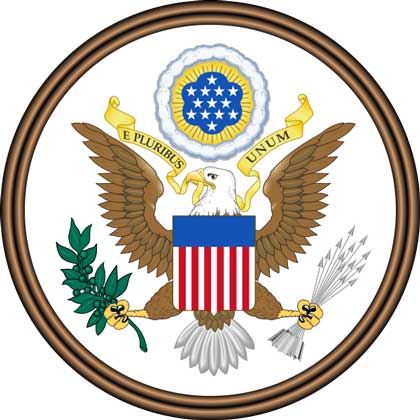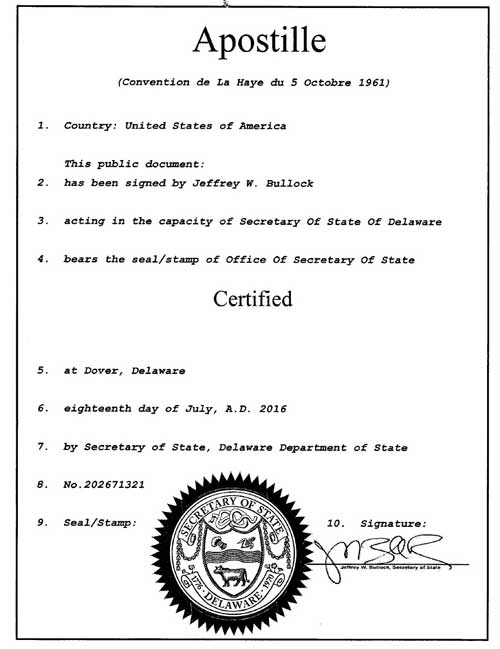
Schmidt & Schmidt covers the full spectrum of legalization services for documents issued in the United States of America.
The United States of America has been a Member of the HCCH since 1994; the Hague Convention on the Simplified Authentication entered into force on 1 April 2008.
The apostille, or the “Hague apostille” is a certificate that authenticates the origin of a public document (e.g., a birth, marriage or death certificate, a judgment, an extract of a register or a notarial attestation). It confirms the authenticity of the signature and the authority of an official who signed the public document.
Documents issued in the United States of America and certified with an apostille in accordance with the Hague Convention of 1961 are recognised in all Member States of the Hague Convention and do not require any other form of certification, such as consular legalization, which considerably reduces the costs and time required for the certification of documents. So far, more than 120 states have joined the Convention.
The apostille is not sufficient for use in the states that are not party to the Hague Convention. In this case, consular legalization applies to a public document.
Designated Competent Apostille Authorities in the United States:
- The U.S. Department of State legalizes federal documents.
- Court secretaries legalize documents issued by the federal courts.
- Secretaries of State legalize documents issued by their respective state.
Legalizing public documents in the United States implies authenticating the origin of the document and the authority of the officials who have affixed the signature, seal or stamp on the document. After such verification, a special stamp - the apostille - is affixed to the public document or its certified copy. The apostille is usually placed on the back of the underlying public document or on a separate attached page.

The following documents can be legalized by apostille:
- Extracts from the commercial register
- Certificates of civil status (certificates of birth, death, marriage and divorce)
- Education documents (school reports, certificates, diplomas)
- Trade register excerpts
- Court decisions
- FBI Background checks
- IRS documents
- Notarially certified copies of documents
- Notarially certified translations
- Further notarial documents (authorizations, last will, declarations)
- Commercial documents legalized by a state registration body (articles of incorporation, registration certificates, tax registrations etc.)
Legalization of educational documents for use abroad
Take the document, with the notarial certificate to the state Notary Public Administration for authentication. If the country where the document will be used is a party to the Hague Apostille Convention, the state Notary Public Administrator will affix an Apostille certificate and no further authentication is necessary.
If the country is not a party to the Hague Apostille Convention, the state Notary Public Administrator will affix a state authentication certificate. You should then send the document to the Authentications Office of the Department of State, following the instructions on that office’s web page.
If necessary, obtain authentication of the U.S. Department of State seal at the foreign embassy in Washington, D.C. The embassy in Washington, DC of the country in which the document is to be used can tell you if this is required.
Obtaining a certificate of good conduct
If you need to prove your clean criminal record for reasons like adoption, school, or work abroad, you can obtain a Local Police Background Check. Simply contact your local police department, county sheriff's office, or state police, depending on where you live.
Fill out a request form, provide ID, and pay any necessary fees. Once processed, you'll receive a report on your criminal record status. Keep in mind that procedures vary by location, so check with your local law enforcement for specific details.
Alternatively, for a more comprehensive check, consider the FBI background check. It covers a national level and may be required by certain organizations. Choose the option that best suits your needs based on the specific requirements of the entity requesting the information.
To authenticate a certificate of good conduct, follow the next steps:
- Visit your local police department for a criminal background check. Ensure the document is signed by an officer and notarized.
- Take the notarized document to the Secretary of State in the issuing state for an apostille. This step usually eliminates the need for additional certifications.
- Once the Secretary of State issues the apostille, your document is ready for use in the destination country.
Consular legalization of documents for use abroad
Should a document be used in a country that does not recognize the Hague Convention, such as the United Arab Emirates or other countries not listed as a contracting party, the procedure of consular legalization, also called “embassy attestation”, applies. For a complete list of countries that accept and use apostilles, click here.
Consular legalization is the process of authenticating or certifying a legal document so a foreign country's legal system will recognize it as with full legal effect that is carried out by the diplomatic or consular mission of the country in which the document is to be used.
Consular legalization is more complex, time-consuming and costly than the simpler apostille procedure. Whereas apostille is usually issued within one step, consular legalization requires several pre-certifications before a public document can be certified at the embassy or consulate of the destination country.
It is a common requirement that the document has to be translated into the official language of the destination country before submission to the embassy. It is up to the diplomatic mission to decide about the authentication procedure.
The main differences between an apostille and consular legalization of documents
The common feature between apostille and consular legalization is that they authenticate an official document for presentation to institutions in another country. However, they have many differences.
| Apostille | Consular legalization | |
|---|---|---|
| Legal effect | Can be used in all countries that are party to the Hague Convention on the Simplified Legalization of Documents. | Use between States one or both of which is not a member of the Hague Convention, or where one of the contracting States has protested the accession of the other. |
| Difficulty | Moderate. To obtain an apostille, contact the competent apostille authority of the state of origin of the document. | High. For consular legalization, various inland authorities and a diplomatic mission of the state of destination must be involved. |
| Pre-certification | Usually not required. | Is obligatory. |
| Attestation at the state of destination embassy in the state of origin of the document | No need to contact the Consulate of the country of destination. | Is the final step of legalization. |
Procurement of documents of the United States
If the important documents are lost or damaged, or current copies of the documents are needed, the re-issue of the documents is required. It is not unusual for people outside the U.S.A to encounter difficulties with obtaining new documents when abroad. Our consultants will help you procure new documents from the States remotely, and we can arrange for your documents to be sent by courier anywhere in the world.
Requirements for the documents:
The apostille can be exclusively issued for the original document. Therefore, the latter must be presented in good condition, with all stamps and signatures clear and readable. Furthermore, it should not contain alien markings or labels.
Additional services
In addition to the legalization of your public documents, we can provide you with high-quality translations.
Should you require company information for use in court, it needs to be legalized as well. We are therefore offering extracts from the commercial register of the United States including the apostille certification and translation into the language of the document's state of destination.

























































